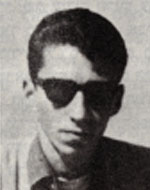Vishingrad, Kalman (Camie)
Kalman (Kami), son of Tzipora and Israel, was born on December 4, 1947 in Petah Tikva. He completed his studies at the “Ramat Hahayal” elementary school and continued to study in the design department of Montefiore High School in Tel Aviv. Camus was a sensitive, withdrawn boy. At the school he was a fairly good student and later joined the Hanoar Haoved movement. He was active in the movement and traveled extensively on trips. On Saturdays and holidays he would go out with his brother and sister for long walks along the banks of the Yarkon River. Camus loved nature and loneliness, and his friends testify that he was always a riddle to them. The few who knew something about his childhood and youth knew what was shaken and suffered from his encounters with a hostile world and a cruel and cruel reality. After two years of schooling he was forced to leave school and went to work to ease the burden of supporting the family. He worked in the Histadrut’s executive committee and in the evenings studied bookkeeping. Kalman was drafted into the IDF in November 1965 and assigned to the Nahal Brigade. After completing basic training, he joined the Ramot Aleph group in the framework of the Nahal Brigade, first completing his education course for soldiers and graduating with honors (94), and was trained as a kolabai and was a soldier in Ketziot in the Negev. In December 1968, Cami was released from regular service and chose to build his home in the field of agricultural resources, although he was an introverted person who did his best to connect himself to the agriculture, to integrate himself into work and in social and cultural life. He willingly took part in training workshops in the framework of labor camps, took care of evenings of dance and dance, and treated devotion and love “We have always come to him with our problems,” he said, adding that he was asked to give the young people all the good and Yaffa that he did not receive as a child, “Cammy listened and helped us solve them. He sent letters to them, asked for news from them, and when he came for a short vacation he listened intently and tried to help as much as he could. Kalman participated in the war in 1967 and was awarded the “Six Day War.” On the eve of the Yom Kippur War he was called to his unit, and his commanding officer testified that thanks to his personality radiant authority and security and his dedication, Kalman was a squad commander. Kalman participated in the battles of the containment and break-up of the Yom Kippur War and passed them safely. After a cease-fire was declared on the southern front, he continued to serve in Sinai. On 10 January 1974, he was hit in the chest by a machine gun fired at him while he was working on a fence located southwest of Fayyad. He was killed and brought to rest in the military cemetery in Kiryat Shaul. Survived by father, mother, brother and sister. After his fall, he was promoted to sergeant. In the letter of condolence to the bereaved family, the battalion commander wrote: “Together with us he went to war and served faithfully and devotedly … In the end of the fighting, the unit held the first line, and Kalman z” l served as a squad commander in the outpost west of the canal … Kalman was a good soldier and commander. Kami’s friends in the field of field crops published a memorial booklet containing lists and memoirs of friends, educators and apprentices.
